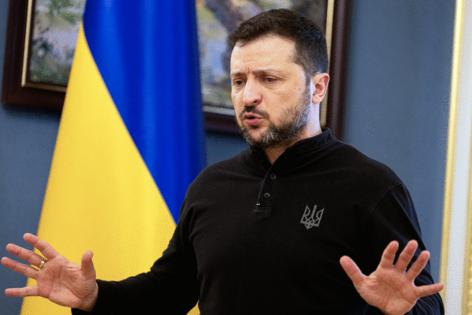Trump calls Zelenskyy 'dictator' as US-Ukraine bonds unravel
Published in Political News
President Donald Trump issued his most direct threat yet to Volodymyr Zelenskyy, saying the Ukrainian president had “better move fast” to reach a deal with Russia “or he is not going to have a Country left.”
Trump’s social media post denouncing Zelenskyy as “a modestly successful comedian” and “a dictator” marks an all-but-final rejection of Ukraine as a full partner in negotiations that Trump has initiated with Russia to end the war that began with Russian President Vladimir Putin’s full-scale invasion of his neighbor three years ago.
The U.S. president has abandoned years of American support for Ukraine, as he prepares to meet with Putin as soon as this month to negotiate a deal to end the war, cutting out Kyiv and its European allies.
Zelenskyy accused Trump of falling victim to Russian “disinformation” and has vowed not to be bound by any peace deal made without Ukraine. That had been the U.S. position under former President Joe Biden. Zelenskyy’s comment drew a warning by Vice President JD Vance, who told the Daily Mail that “badmouthing” Trump “is an atrocious way to deal with this administration.”
The open breach with the leader of what had been Zelenskyy’s most important ally raises deep questions about Ukraine’s ability to fight on.
Senior officials from the U.S. and Russia met for a first round of talks on ending the war in Saudi Arabia on Wednesday. Ukraine wasn’t invited, compounding fears that a deal to end the war will be reached without Kyiv’s involvement. Putin said Wednesday that he regarded the outcome of the meeting in Riyadh positively.
“We haven’t seen each other for a long time,” Putin told reporters. He reiterated that he was ready to meet with “Donald,” but that further preparation was needed before a summit could take place.
Trump said Tuesday evening that he and Putin would probably meet before the end of the month.
Mike Waltz, Trump’s national security advisor, said Wednesday that the Trump-Zelenskyy relationship “clearly is going in the wrong direction.” But he told Fox News that Trump is engaging in “shuttle diplomacy,” contacting both Putin and Zelenskyy in an effort “to drive this to a diplomatic solution.”
As European allies express alarm over Trump’s approach, Waltz said that he talked with European counterparts by phone on Wednesday. “We’re engaging on all sides,” he said.
French President Emmanuel Macron and UK Prime Minister Keir Starmer are both coming to Washington next week, Waltz said. Although Starmer’s visit has been announced, Macron’s staff didn’t immediately respond to an inquiry about a White House visit.
German Chancellor Olaf Scholz slammed Trump for his remarks on Ukraine, telling Spiegel magazine that “it is simply wrong and dangerous to deny President Zelenskyy democratic legitimacy.”
In Trump’s comments on Tuesday evening, he blamed Ukraine for Russia’s invasion and asserted that Zelenskyy’s public support was at 4% — a level belied by all available polling — and mentioned that wartime Ukraine hasn’t held an election, a demand that’s been made by the Kremlin.
Zelenskyy is supported by 57% of Ukrainians, up from 52% from a similar survey conducted in December, according to a Feb. 4-9 poll of 1,000 people by the Kyiv International Institute of Sociology.
In Washington, Trump’s latest comments drew muted criticism from some Republican lawmakers who in the past have supported Ukraine.
“Russia is the aggressor, there’s no question about that,” Senate Majority Leader John Thune told reporters. “He can speak for himself, but in my view there is no question who started the war.”
Senator Thom Tillis of North Carolina said “Zelenskyy has been the right head of state, I think, to hold his country together in the face of the Russian occupier” while “Putin is a murderer and he needs to be stopped.”
Democratic Senator Richard Blumenthal of Connecticut called Trump’s comments “a disgusting betrayal.”
European allies struggled to keep up with the shift in the U.S. position. The European Union’s foreign policy chief, Kaja Kallas, said “the Russian narrative is really gaining ground.”
“The only ones who are saying it was Ukraine who is to blame are the Russians,” she told Bloomberg in an interview in Cape Town, South Africa.
Military chief
As talks proceed, hostilities continue. Russia hit Ukraine’s southern port city of Odesa with a massive drone strike overnight, just hours after U.S. and Russian officials ended their meeting. U.S. special envoy Keith Kellogg arrived in Kyiv early Wednesday to continue consultations on ending the war.
Yet the calls to hold elections are increasingly putting Zelenskyy in a bind and risk eroding his position as the country’s leader.
Ukraine has rejected calls to hold the vote for fear of Russian interference and the sheer challenge of organizing the vote in wartime. Martial law, which remains in place in the country, prohibits holding an election.
“If someone wants to replace me right now — right now won’t work,” Zelenskyy said. “Unfortunately, President Trump — I treat him with great respect as a leader of a people that we truly respect, the American people, who support us constantly — unfortunately lives in this disinformation space.”
But the Ukrainian leader may face political challenges ahead. Valerii Zaluzhnyi, a former popular military chief who is now Ukraine’s ambassador to the UK, didn’t explicitly rule out running in an election against Zelenskyy when asked about his political ambitions.
“To answer this question, let’s first establish conditions to make this issue relevant,” the ambassador said via video link from London at an event in Kyiv on Wednesday. “When these conditions materialize, I, as a civil servant, working for the state, will be ready to answer such questions.”
_____
(With assistance from Aliaksandr Kudrytski, Greg Sullivan, Tony Halpin, Erik Wasson, Michael Nienaber and Ania Nussbaum.)
_____
©2025 Bloomberg News. Visit at bloomberg.com. Distributed by Tribune Content Agency, LLC.




























































Comments